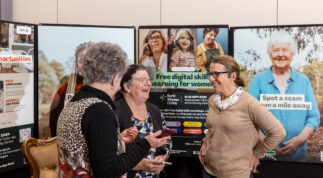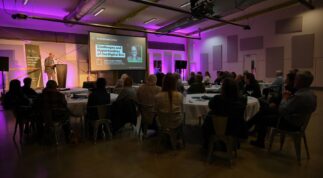In the last few months, the Victorian Women’s Trust (VWT) proudly hosted two significant keynotes. The first featured Prof Julian Thomas (Director of the ARC Centre for Automated Decision-Making and Society, RMIT University), followed by an address from author and journalist Anna Krien, regular contributor to The Monthly, The Saturday Paper, and other key Australian publications.
Each of their addresses — both on the topic of “Challenges and Opportunities of the Digital Era” — were presented as part of VWT’s digital inclusion initiative, Rural Women Online. Their speeches represented the pinnacle of a week-long digital skills Intensive (one in held Greater Shepparton and the other in a little town called Yackandandah, in north-east Victoria). These Intensives aimed to bring together women from regional areas, empowering them with digital skills—everything from scam prevention to protecting personal data.
Speaking at the Greater Shepparton Intensive, Prof Julian Thomas illustrated the depth of the digital divide and how it impacts struggling households. A pivotal moment within his address arrived with the example of how technology connects with the day-to-day lives of 10 average Australians. Picture 10 people, Prof Thomas told the audience, and their digital access and use breaks down into the following categories: seven out of 10 will use the internet for work/study and medical appointments; and eight out of 10 will have the digital know-how to regularly stream music and other entertainment (a number that has increased significantly in the last 10 years). Nine out of 10 will use their devices to stay connected to family and friends, for banking online, using government services. This highlights that, for the majority of Australians, the internet is a daily necessity; many people’s lives revolve around the use of tech.
“Digital technology becomes powerful when it fades into the background of our lives,” he said. “When it becomes mundane.” Going further into this example of the average 10 Australians, Prof Thomas zeroed in on the widening disparity between people who use tech with ease, and others who remain on the fringes. Of those seven, eight or nine out of 10 Australians who use the internet daily, they fit a very specific demographic: likely to live in an urban area, probably young, and university educated. They likely to represent the Australian middle class.
It’s important to keep our focus, urged Prof Thomas, on the one to three people who aren’t so well connected digitally. Research from the ARC Centre for Automated Decision-Making and Society shows that while digital may have become a ‘mundane’ force in the majority of Australians day-to-day existence over the last 25 years, two out of 10 Australians remain “digitally excluded, [and] lack access to quality, reliable and affordable internet.”
“We have failed to meet the communication needs of that significant minority of Australians,” said Prof Thomas. “But our conversation, our organisations, our governments and businesses who all deliver essential services online are generally catering for the seven or eight or nine out of 10, rather than for the minority.”
Speaking at the Yackandandah Public Hall in September, Anna Krien built further on Prof Thomas’s insights. Her speech, which was later picked up as the cover article for the November edition of The Monthly (‘The people who mistook their lives for an app’), grappled with the complexities and cost of engaging with tech. She began by picking apart exactly what’s so wrong with the seemingly simple statement, “the future is digital”, deftly linking this cosy idea with the profit margins of tech giants, such as Google. “Well, Google would say that, wouldn’t they?”
Importantly, Anna highlighted the rise of tech over the decades and the ways in which it has infiltrated our communities, not just as a point of distraction but also as a disruption of the intimate bonds that give meaning to our lives. Bringing together voices like beloved neurologist and writer Oliver Sacks and puffed up alternative music figures like John Barlow of the Grateful Dead, Anna’s speech deeply questioned the role of tech in our lives and the risks of providing a megaphone on a mass scale to those with the least sound ideas.
Anna also pointed out other ways the tech industry manipulates our world, such as environmental harms being committed in the name of digital progress. “There is an ever growing stake in the global emissions pie — 4% now — in the data centres, blocky warehouses full of servers. Someone cites the size of suburbs. They have a bigger carbon footprint than the airline industry.” And then there’s the ongoing disinterest from digital corporations to adhere to regulations that would protect citizens, a story that is all too familiar. “It is now documented that car manufacturers poured millions into lobbying against safety standards that would cut into their profits,” said Anna. “Just as the tech industry fights regulation today.”
There is no escaping tech. Modern life is intertwined with devices. As both speakers noted, digital has now replaced all manner of traditional services and infrastructure. We have no choice but to engage with it. As Anna said, “that’s what this week has been about, learning how to use technology, not letting technology use you.” Prof Julian Thomas and Anna Krien may have delivered two very different takes, but the points of convergence were clear: the only way we can forge a path forward as a society in the age of digital is to keep placing people at the centre, not tech — an idea which, of course, resonates strongly with the ethos of Rural Women Online.
These keynotes were presented as part of Rural Women Online. We thank NBN for their support of each keynote event. Rural Women Online was made possible thanks to support from our major partners, Helen MacPherson Smith Trust, and Bendigo Bank Community Enterprise Foundation.



